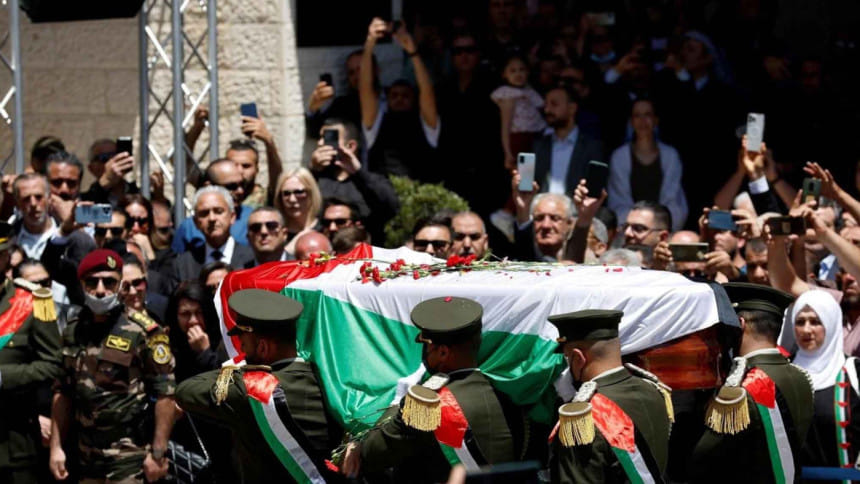The murder of Shireen Abu Akleh: Another voice for Palestine muted

"Occupation forces storm Jenin and besiege a house in the Jabriyat neighbourhood. On the way there, I will bring you news as soon as the picture becomes clear," emailed Shireen Abu Akleh to Al Jazeera at 6:13 on Wednesday morning. The news never came. Abu Akleh was killed in cold blood by the Israeli forces when she went to cover their raid in a refugee camp in Jenin in the occupied West Bank. Out of nowhere, she was shot in the face by the Israeli forces, without any confrontation with them or any form of provocation. The blue flak jacket Abu Akleh was wearing was clearly marked with the word "PRESS."
A video footage of the incident shows Abu Akleh lying on the ground, her face smeared with blood—she suffered skull fractures and cerebral laceration—when she was being rescued by the local Palestinians. Later, the Israeli military raided her home, perhaps as an act to intimidate her family, friends and the greater Palestinian community into silence.
While this "shocked" the world, it did not seem to have the same effect on the Israeli apartheid regime, who initially tried to put it on the Palestinians, saying stray firing from them could have caused Abu Akleh's death. "According to the data we currently have, there is a considerable chance that armed Palestinians, who fired wildly, are what led to the unfortunate death of the journalist," tweeted Israeli Prime Minister Naftali Bennett. Later, though, they had to resort to a reverse statement with Israel's military chief, Lt Gen Aviv Kochavi, saying they were not clear who shot Abu Akleh.
And it does not come as a surprise that for Israel, this is perhaps only business as usual, because Abu Akleh is not the first Palestinian journalist who has been killed by Israel—nor is she going to be the last, unfortunately. According to the Palestinian Journalists Syndicate (PJS), since 1967, when West Bank and Gaza were occupied by Israel, 86 Palestinian journalists have been killed. In the last two years alone, six Palestinian journalists have been killed in the occupied Palestinian territory.
Recently, the International Federation of Journalists (IFJ), the PJS, and the International Centre of Justice for Palestinians filed a complaint with the International Criminal Court for "systematic targeting of Palestinian journalists" by the Israeli forces.
Reporters without Borders (RSF) suggested that 144 Palestinian journalists had been hit with "live rounds, rubber bullets, stun grenades or tear gas fired by Israeli soldiers or police," in the occupied Palestinian territory since the beginning of the weekly Great March of Return protests in 2018. And one would remember the bombing of the offices of Al Jazeera and Associated Press (AP) in May last year in the besieged Gaza Strip, during the 11-day attack by Israel. And the lack of adequate and proportionate response by the international community after every such incident only emboldens Israeli aggression against the Palestinians. Israel perhaps is under the impression that they can continue to unleash their brutalities on the Palestinians with impunity, and they would not be wrong in thinking so, because there is no organisation, no international body to hold them accountable for their actions, just like there is no one to hold the Myanmar military accountable for their atrocities against the Rohingyas.
In the wake of Abu Akleh's murder, the US and EU, among others, have released statements condemning the killing. While the US Department of State shamelessly welcomed the investigation that was announced by Israel—the culprit investigating whether it committed the crime or not—saying the apartheid regime "has the wherewithal to conduct a thorough investigation," US Congresswoman Rashida Tlaib suggested that the US government should investigate the killing. But the US itself is one of the strongest allies of the criminal regime and provides them with weapons and the resources to carry out such heinous crimes. The irony of these two-faced statements is not lost on people. If anything, the templated condemnations and hollow words from the international community only expose their hypocrisy.
Had Abu Akleh been a Ukrainian journalist and Russian forces committed the same crime, would the response from the world community be the same? Certainly not. There would be immediate UNSC meetings, Nato discussions, a barrage of sanctions and other measures in place by now, to say the least. But for a Palestinian journalist, perhaps only a few thoughtless words suffice. And no one is asking Israel: What was its military doing, conducting a raid inside the Palestinian territory? Such illegal acts by Israel have become normalised, because they have been allowed by the international community to get away with even worse crimes—invading another's territory, ethnic cleansing, and grossly flouting international territorial and human rights conventions—over the decades.
But people are watching both Israel and the world, and their constant and bloody attempts—directly and through tacit support—to suppress the Palestinians and deny them their right to self-determination.
Shireen Abu Akleh was a journalist, whose only fault was that she was in the right place, at the right time, doing her job of exposing the truth. By killing her, Israel has once again sent a message to the journalists who are risking their lives every day to give a voice to the Palestinians, and to the Palestinians: That they shall be forced to remain voiceless.
Tasneem Tayeb is a columnist for The Daily Star. Her Twitter handle is @tasneem_tayeb

 For all latest news, follow The Daily Star's Google News channel.
For all latest news, follow The Daily Star's Google News channel. 



Comments